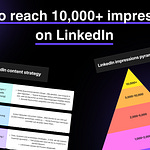When it comes to positioning, ICP and messaging, clarity is crucial. Clarity about who your product is really for, what problems it truly solves, and what your market actually cares about.
In a recent conversation with Gabriel Böker, founder of 'SaaS Growth' where he offers startups an 8-weeks growth bootcamp, we explored how founders can use qualitative interviews to build this clarity and turn it into sharper positioning, messaging, and acquisition strategies.
Why founders need to talk to their market , and what most get wrong
Gabriel highlighted that many founders, especially in tech, build first and assume users will follow. But markets don’t work that way. “Solving a product really demands deep market insights,” he explains. Without those, even the most elegant solution can miss the mark. Founders need to move beyond assumptions and get close to the lived experience of their target audience.
Importantly, Gabriel cautions against asking prospects what solution they want. “People are really bad at predicting the future,” he says. Instead, the gold is in the past, what people have actually done, not what they say they would do.
How to structure interviews that reveal the truth
Skip hypotheticals and future-gazing. Focus on uncovering the real, painful problems people have already faced. Gabriel suggests questions like:
When was the last time you encountered [problem space]?
What happened? How did you try to solve it?
What workarounds did you create?
How did those workarounds fall short?
How often does this problem arise? What does it cost you, in time, money, effort, or stress?
What other solutions have you tried? Why did they fail?
Then, layer in follow-ups. A simple but powerful tool: keep asking why. Gabriel puts it plainly: “When you ask why and dig deeper, you help people reflect on the real burdens they face, the emotional, economic, and operational costs.”
I recommend you check out the 5 Whys Framework, if you want to dig a bit deeper.
Because this is where the magic happens: where surface-level complaints give way to the root causes and unmet needs that can shape your positioning and product roadmap.
What founders can learn if they really listen
When you approach interviews this way, you uncover:
The true severity and frequency of different pain points
The gaps in existing alternatives (and why those gaps matter)
The exact language your ICP uses to describe their struggles
The emotional drivers (frustration, fear, hope) that influence buying behavior
These aren’t just insights, they’re raw materials for positioning that resonates, messaging that cuts through the noise, and features that solve problems people will pay to eliminate.
How many interviews are enough?
Gabriel’s take: aim for 10, 20 high-quality interviews. You’re not trying to hit statistical significance; you’re trying to spot patterns. “Better 10 deep conversations than 50 shallow ones,” he emphasizes.
Crucially, these interviews should be with people who genuinely fit your ICP. That’s where depth and relevance come from. And remember: even as your startup grows, this work doesn’t stop. As Gabriel points out, target audiences evolve. The companies that keep listening avoid the trap of irrelevance.
From raw insights to better marketing & sales
After you’ve run your interviews, the job is to synthesize:
What themes came up repeatedly?
Which problems feel most painful and urgent?
Where do existing solutions fall short, and why?
Gabriel recommends creating a simple mapping: problems, existing workarounds, costs of those workarounds, and gaps in alternatives. From here, craft your positioning and messaging to speak directly to these high-pain, high-frequency problems, using the exact words your customers used. “That’s how you build something that fits,” he says.
A practical resource to deepen this skill: The Mom Test.
It is essential reading for founders who want to get customer conversations right.
Getting people to say yes to an interview
Founders often assume they need to offer incentives to get interviews. While that can help, Gabriel notes that many people will talk simply because they want to help or are excited by the chance to influence a new solution.
His advice:
First, know where your ICP spends time (events, communities, podcasts, industry forums).
Understand what motivates them. Some respond to charity donations. Others like being early adopters or having their voice heard.
Tailor your outreach to reflect this.
The result? More yeses, and more meaningful conversations.
Final thoughts: Interviews as part of an iterative growth engine
Gabriel’s last piece of advice: treat interviews as an ongoing practice, not a one-time task. “Marketing, positioning, user research, sales, it’s all iterative. Just like product development.”
Founders who build this muscle, who stay close to their market, create startups that stay relevant, solve real problems, and grow faster because they truly understand what their customers value.
If you’re an early-stage founder, consider this your unfair advantage: put down the growth hacks for a moment, and go talk to your market.
Want to learn more? Subscribe to the newsletter and follow Valentin (me) on LinkedIn.










